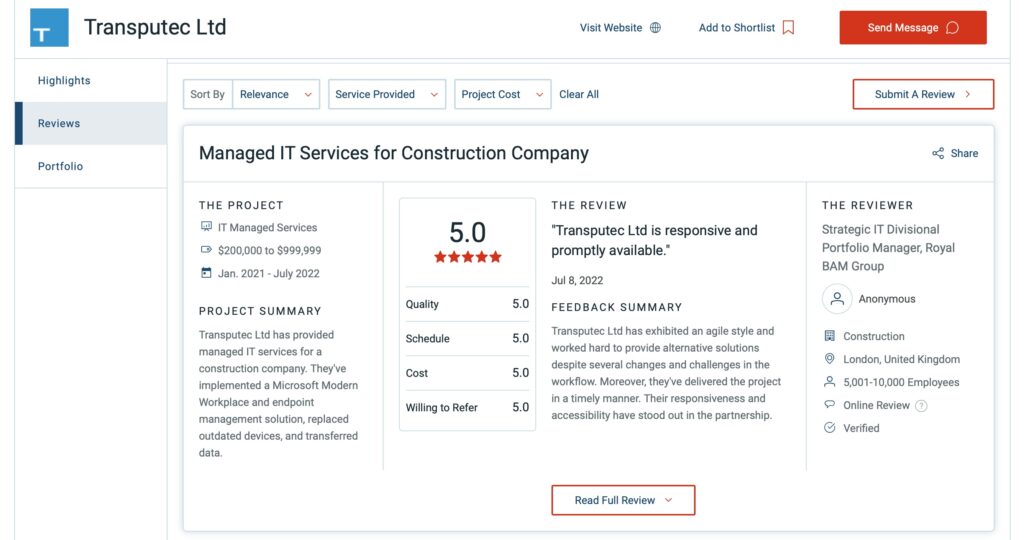As a business owner or manager, you understand the importance of efficient IT infrastructure and reliable support. However, managing your IT needs in-house can be challenging and time-consuming. That’s where IT managed services providers like Transputec come in. Outsourcing your IT needs can help streamline your business operations and allow you to focus on growing your business.
But how do you choose the best IT managed services provider for your business? With so many providers to choose from, it can be overwhelming to know where to start. In this article, we’ll provide tips on selecting the best provider for your business needs.
Key Takeaways
- Choosing the right IT managed services provider is crucial for streamlining your business operations
- Assess your business needs, evaluate service offerings, and consider pricing models before making a decision.
- Research potential providers, read online reviews and testimonials, and seek client references to ensure you choose the best provider for your business.
Understanding Managed Services
Before exploring the process of choosing the best IT managed services provider, it’s essential to understand what managed services entail. Managed services encompass a range of proactive and reactive IT support and maintenance activities that are typically outsourced to a third-party provider.
The benefits of managed services include:
- Reliable IT support: Managed service providers (MSPs) offer 24/7 IT support to ensure your business operations run smoothly.
- Proactive maintenance: MSPs use remote monitoring tools to detect and address issues before they become critical, minimizing disruptions to your business.
- Cost-effective: Outsourcing IT support to an MSP can reduce costs associated with in-house IT staff and infrastructure.
- Improved security: MSPs provide comprehensive cybersecurity measures to protect your business from cyber threats.
One of the key benefits is the ability to outsource IT support and maintenance to a team of experts, allowing you to focus on your core business activities. Rather than reacting to IT issues as they occur, managed services allow you to be proactive in maintaining your IT infrastructure.
Tip: With proactive maintenance, MSPs identify and resolve IT issues before they become critical, reducing downtime and maximising productivity.
Managed services are typically offered through a range of service level agreements (SLAs), which outline the responsibilities and expectations between you and the MSP. These agreements may include response time guarantees, uptime guarantees, and other key performance indicators (KPIs) to ensure the MSP meets your business needs.
The Role of IT Support in Managed Services
One of the primary functions of managed services is to provide IT support to your business. Whether you require help desk support, network troubleshooting, or hardware repair, MSPs can provide comprehensive IT support to ensure your business operations run smoothly.
When evaluating potential MSPs, consider their level of IT support, including the availability of service desk support, on-site support, and remote support options.
Proactive Maintenance Services
Proactive maintenance is a critical component of managed services. MSPs use remote monitoring tools to detect and address IT issues before they become critical, reducing downtime and improving productivity.
When evaluating potential MSPs, consider the level of proactive maintenance services they offer, including:
- Regular system backups
- 24/7 network monitoring
- Software updates and security patches
- Hardware maintenance and repairs
By ensuring your IT infrastructure remains up-to-date and secure, MSPs can help you stay ahead of potential IT issues, maximising productivity and minimising downtime.
Evaluating Your Business Needs
When it comes to choosing the best IT managed services provider, it is crucial to evaluate your business needs. This includes assessing your IT infrastructure, scalability requirements, and the level of security you need.
Firstly, consider your IT infrastructure. Do you have complex IT systems that require round-the-clock monitoring and maintenance? Or do you have a smaller setup that only requires occasional support? Understanding your IT infrastructure will help you determine what level of support you need from an IT managed services provider.
Scalability is also a key consideration. As your business grows, your IT needs will evolve, and you need to ensure your chosen provider can keep up with your changing requirements. Whether it’s adding new users, expanding to new locations, or implementing new technologies, your provider should be able to support your growth.
Finally, think about the level of security you require. With cyber threats becoming increasingly sophisticated, it’s essential to ensure your IT managed services provider has the necessary security measures in place to protect your business. This may include measures such as data encryption, firewalls, and regular security audits.
Researching Potential Providers
When searching for the best IT managed services provider to meet your business needs, it is essential to conduct thorough research on potential providers. Here are some crucial steps to follow:
Gather Information on the Best IT Managed Services Providers
Begin by compiling a list of potential the best IT managed services providers that operate in your area. You can search for providers on online directories, forums, and social network groups. When creating your list, ensure that each provider offers services that align with your business needs.
Read Online Reviews
Online reviews from past and present clients offer valuable insight into the performance and reliability of the best IT managed services providers. You can look for online reviews on provider websites, social media pages, and dedicated review websites. Make sure to read both positive and negative reviews to get a balanced view of each provider’s performance.

Tip: Look for patterns in the reviews you read. If several clients mention a specific strength or weakness, it is likely that it is accurate and relevant.
Request Testimonials and Case Studies
Testimonials and case studies provide feedback on the provider’s services and showcase their ability to solve IT problems, manage IT infrastructure, and minimise system downtime. Request these from potential providers and review them thoroughly to ensure they are a good fit for your business.
Consider Industry Experience
Experience matters in the IT industry. When evaluating potential the best IT managed services providers, consider their experience serving clients in your industry. Providers that have experience working with businesses similar to yours will have a better understanding of your business needs and can offer tailored solutions.
Explore Provider Websites
Visiting the MSPs websites can help you understand their service offerings, pricing models, and industry experience. Take time to explore their website and look for relevant information such as their team, mission statement, and blog articles.
Compare Providers Side by Side
When researching potential IT managed services providers, it is important to compare them side by side. Create a table that lists the providers and includes relevant information such as services offered, pricing models, industry experience, and client references. This table will help you evaluate and compare potential providers to select the best fit for your business.
Evaluating Service Offerings
When selecting the best IT managed services provider, evaluating their service offerings is a crucial step in the process. The right provider should offer a range of services to meet your business needs.

IT Support
One of the most important service offerings is IT support. This includes providing technical assistance to help resolve any issues that arise with your systems or software. Look for a provider that offers 24/7 support with quick response times to ensure your business can keep running smoothly.
Network Monitoring
Network monitoring is another essential service offered by IT managed services providers. This involves the constant monitoring of your network for any potential issues or threats. The provider should have the necessary tools to detect and prevent any security breaches and quickly resolve any network disruptions.
Cybersecurity
As cyber threats continue to evolve, it is crucial to have a provider that offers robust cybersecuritymeasures to protect your business. Look for a provider that offers regular security assessments, firewall protection, and data encryption to keep your business and customer data secure.
Disaster Recovery
In the event of a disaster or system failure, having a disaster recovery plan can be the difference between a minor disruption and a major catastrophe for your business. Make sure your IT managed services provider offers disaster recovery services, including regular backups of your data and a plan to quickly restore your systems in the event of an outage.
Service Contract
When evaluating service offerings, it is important to review the provider’s service contract to ensure it meets your business needs. Look for a provider that offers a flexible contract with options to scale services up or down as your business grows or changes.
Assessing Pricing Models
When choosing an IT managed services provider, it is essential to consider the pricing models they offer. Understanding the differences between the various pricing options can help you make an informed decision that aligns with your business requirements.
Fixed Fee
A fixed fee pricing model offers a set monthly or yearly price for a specific set of services. This option provides predictable costs and can be beneficial for businesses with a strict budget. However, it may have limitations on the services offered, and any additional services needed may incur extra costs.
Pay-as-you-go
A pay-as-you-go pricing model allows businesses to pay for only the services they use. This can be a flexible option for businesses with fluctuating IT needs. However, costs may be unpredictable, and it may be challenging to budget for the services needed.
Contract Terms
Contract terms pricing models offer a specified length of the contract, usually between one to three years, with a set monthly or yearly price. This option can provide predictability and stability for businesses and may include additional services and support. However, breaking the contract early may result in penalties or fees.
It is important to evaluate your business needs and choose the pricing model that aligns best with your budget and IT requirements.
Considering Industry Experience and Certifications
When it comes to choosing the best IT managed services provider, industry experience and certifications are crucial factors to consider. Your provider should have the necessary knowledge and skills to meet your business’s needs while keeping up with the latest IT industry standards.
Industry experience: A provider with extensive industry experience is more likely to have encountered and resolved a wide range of IT issues. They will be better prepared to offer tailored solutions and provide reliable IT support for your business.
Certifications: Certifications demonstrate a provider’s commitment to meeting industry standards and staying current with emerging technologies.
| Benefits of Industry Experience and Certifications | Example |
|---|---|
| Providing specialised services | If your business requires specialised IT services, such as cloud computing or cybersecurity, industry experience is critical. A provider with experience in these areas will be better equipped to provide effective solutions. |
| Keeping up with industry trends | Certifications require ongoing training and education, which ensures the provider stays up to date with industry trends. This means your business benefits from the latest advancements in IT. |
| Ensuring compliance | Certifications often include training on regulatory compliance, such as GDPR. This means your provider can ensure your business remains compliant and avoids any legal pitfalls. |
When evaluating potential IT managed services providers, ask about their industry experience and certifications. This will help you identify providers who are best equipped to meet your business’s IT needs and ensure reliable support.
Evaluating Service Level Agreements
When choosing an IT managed services provider, one crucial aspect to consider is the service level agreement (SLA). An SLA is a contract that outlines the services provided by the provider and the level of support and uptime guarantee you can expect.
Some key factors to review in an SLA include:
- Response time: This is the time it takes for the provider to respond to your support request. Make sure to review the guaranteed response time and understand the escalation process.
- Uptime guarantee: This is the percentage of time your IT systems will be up and running. Review the provider’s uptime guarantee and understand the compensation or penalty structure in case of downtime.
It is important to carefully review the SLA and ensure it aligns with your business needs and expectations. If you have any questions or concerns, don’t hesitate to ask the provider for clarification or customization.
“Remember, an SLA is a two-way agreement, and it is important to ensure both parties have a clear understanding of the expectations and responsibilities outlined in the contract.”
By thoroughly evaluating the SLA, you can ensure you choose an IT managed services provider that provides the level of support and uptime guarantee your business requires.
Seeking Client References
When choosing an IT managed services provider, it is essential to seek client references to gain insights into their performance and client satisfaction. Testimonials and case studies provide valuable information about the provider’s experience and expertise.
Before requesting client references, consider the following:
- Ask the provider for references that are in a similar industry or have similar business needs as your company.
- Request at least three references.
- Prepare a set of questions to ask the references that will help you gauge the provider’s performance and suitability for your business.
When contacting the references, ask questions such as:
“How satisfied are you with the IT managed services provided by the company?”
“How responsive is the provider when you have IT issues or concerns?”
“Have they helped you improve your IT infrastructure and streamline your business operations?”
Reviewing case studies can also provide valuable insight into the provider’s experience and successes. Look for case studies that are relevant to your business needs and examine how the provider helped solve similar problems.
| Client | Industry | Services Provided | Results |
|---|---|---|---|
| ABC Company | Retail | IT Support, Network Monitoring, Disaster Recovery | Reduced IT downtime by 50%, increased network security, and improved disaster recovery capabilities |
| XYZ Corporation | Finance | Cybersecurity, Compliance Management | Increased cybersecurity measures to meet industry compliance standards and protected against cyber threats |
By seeking client references and reviewing case studies, you can gain a better understanding of the provider’s capabilities and ensure they are a good match for your business needs.
Making the Final Decision
After evaluating potential IT managed services providers based on various factors such as service offerings, pricing models, industry experience, and client references, it is time to make the final decision.
Before signing a contract with an IT managed services provider, consider the following:
- Comprehensive evaluation: Review all the information gathered during the research process to ensure that the provider meets your business needs, offers the necessary services, and has a pricing model that aligns with your budget.
- Contract terms: Carefully review the contract terms, including the length of the agreement, termination clauses, and any potential hidden fees or charges.
- Service Level Agreements: Review the SLA to ensure that the response time, uptime guarantee, and other key metrics align with your business requirements.
- Communication: Ensure that the IT managed services provider has a clear and open communication channel for any issues that may arise.
Based on the comprehensive evaluation, select the IT managed services provider that best aligns with your business needs, budget, and goals.
Remember that outsourcing to a MSP can bring many benefits, including streamlined business operations, reliable IT support, and access to industry expertise. By selecting the best IT managed services provider, you can achieve these benefits and focus on growing your business.
Conclusion
Outsourcing to a MSP can be a game-changer for businesses of all sizes. By choosing the best IT managed service provider, you can streamline your operations, ensure reliable IT support and benefit from proactive maintenance.
To make the right decision, you need to evaluate your business needs, research potential providers, consider their service offerings, pricing models, and industry experience. You should also review their SLAs, and seek client references before making the final decision.
By following the tips provided in this article, you can confidently find and choose the best MSP for your business. With their expertise, you can focus on growing and expanding your business while they take care of your IT needs.
Choosing the Best IT Managed Service Provider for Your Business
Outsourcing to an MSP can be a smart investment that can help you streamline your business operations and reduce IT-related stress. By choosing the best IT managed service provider, you can benefit from their expertise, proactive maintenance, and reliable IT support.
Remember, the best MSP for your business depends on your specific needs, budget, and goals. So take your time, ask the right questions, and evaluate all the factors before making the final decision.
Thank you for reading this guide. We hope that it has given you valuable insights into choosing the best MSP for your business, contact us if you want to discuss more and how we help business streamline their IT.
FAQ
How do I choose the best IT managed services provider?
Choosing the best IT managed services provider involves considering factors such as your business needs, researching potential providers, evaluating their service offerings, assessing pricing models, considering industry experience and certifications, reviewing service level agreements, seeking client references, and conducting a comprehensive evaluation before making the final decision.
What are the benefits of managed services?
Managed services offer benefits such as proactive maintenance, reliable IT support, and the ability to streamline your business operations by outsourcing IT management to a trusted provider.
How do I evaluate my business needs?
To evaluate your business needs, consider factors such as your IT infrastructure, scalabilityrequirements, and the level of security you require. This assessment will help you align your needs with the services offered by potential IT managed services providers.
How should I research potential IT managed services providers?
Researching potential IT managed services providers involves reading online reviews and testimonials, evaluating their industry experience, and considering factors such as their reputation and track record in the industry.
What service offerings should I evaluate?
When evaluating service offerings, consider key services such as IT support, network monitoring, cybersecurity measures, and disaster recovery options. This will ensure that the provider can meet your specific IT needs.
What pricing models are available for IT managed services?
IT managed services providers typically offer pricing models such as fixed fee, pay-as-you-go, and contract terms. Understanding the differences between these models will help you choose the pricing structure that best fits your budget and requirements.
Why is industry experience and certifications important?
Industry experience and certifications demonstrate the expertise of an IT managed services provider in meeting IT industry standards. By considering these factors, you can ensure that the provider has the necessary knowledge and skills to support your business.
What should I review in service level agreements?
When reviewing service level agreements (SLAs), focus on key aspects such as response time and uptime guarantees. These terms and conditions will outline the level of service you can expect from the provider.
How do I seek client references?
To seek client references, request testimonials and case studies from potential IT managed services providers. This will give you insights into their performance and client satisfaction, helping you make an informed decision.
How do I make the final decision?
To make the final decision, conduct a comprehensive evaluation based on your research, assessment of service offerings, pricing models, industry experience, certifications, and client references. This will ensure that you choose the best IT managed services provider for your business.







